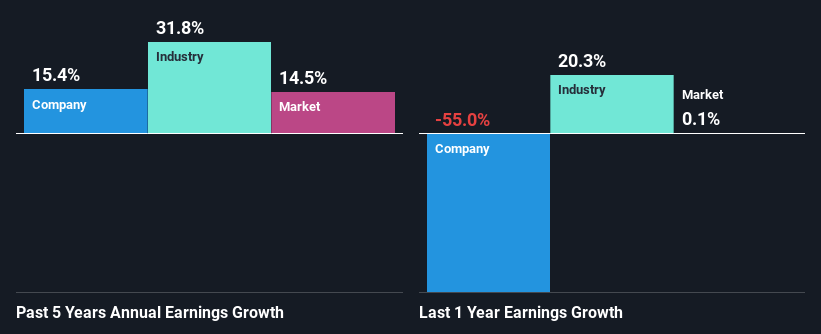AudioCodes Ltd.'s (NASDAQ:AUDC) Stock Is Going Strong: Have Financials A Role To Play?
AudioCodes (NASDAQ:AUDC) has had a great run on the share market with its stock up by a significant 20% over the last three months. We wonder if and what role the company's financials play in that price change as a company's long-term fundamentals usually dictate market outcomes. In this article, we decided to focus on AudioCodes' ROE.
Return on Equity or ROE is a test of how effectively a company is growing its value and managing investors’ money. Simply put, it is used to assess the profitability of a company in relation to its equity capital.
See our latest analysis for AudioCodes
How Do You Calculate Return On Equity?
The formula for return on equity is:
Return on Equity = Net Profit (from continuing operations) ÷ Shareholders' Equity
So, based on the above formula, the ROE for AudioCodes is:
7.1% = US$13m ÷ US$179m (Based on the trailing twelve months to September 2023).
The 'return' is the amount earned after tax over the last twelve months. That means that for every $1 worth of shareholders' equity, the company generated $0.07 in profit.
What Has ROE Got To Do With Earnings Growth?
So far, we've learned that ROE is a measure of a company's profitability. Depending on how much of these profits the company reinvests or "retains", and how effectively it does so, we are then able to assess a company’s earnings growth potential. Generally speaking, other things being equal, firms with a high return on equity and profit retention, have a higher growth rate than firms that don’t share these attributes.
A Side By Side comparison of AudioCodes' Earnings Growth And 7.1% ROE
At first glance, AudioCodes' ROE doesn't look very promising. However, its ROE is similar to the industry average of 8.7%, so we won't completely dismiss the company. Even so, AudioCodes has shown a fairly decent growth in its net income which grew at a rate of 15%. Considering the moderately low ROE, it is quite possible that there might be some other aspects that are positively influencing the company's earnings growth. For example, it is possible that the company's management has made some good strategic decisions, or that the company has a low payout ratio.
Next, on comparing with the industry net income growth, we found that AudioCodes' reported growth was lower than the industry growth of 32% over the last few years, which is not something we like to see.
Earnings growth is an important metric to consider when valuing a stock. What investors need to determine next is if the expected earnings growth, or the lack of it, is already built into the share price. Doing so will help them establish if the stock's future looks promising or ominous. Has the market priced in the future outlook for AUDC? You can find out in our latest intrinsic value infographic research report.
Is AudioCodes Making Efficient Use Of Its Profits?
With a three-year median payout ratio of 38% (implying that the company retains 62% of its profits), it seems that AudioCodes is reinvesting efficiently in a way that it sees respectable amount growth in its earnings and pays a dividend that's well covered.
Besides, AudioCodes has been paying dividends over a period of five years. This shows that the company is committed to sharing profits with its shareholders.
Conclusion
In total, it does look like AudioCodes has some positive aspects to its business. Namely, its respectable earnings growth, which it achieved due to it retaining most of its profits. However, given the low ROE, investors may not be benefitting from all that reinvestment after all. Having said that, looking at the current analyst estimates, we found that the company's earnings are expected to gain momentum. To know more about the latest analysts predictions for the company, check out this visualization of analyst forecasts for the company.
Have feedback on this article? Concerned about the content? Get in touch with us directly. Alternatively, email editorial-team (at) simplywallst.com.
This article by Simply Wall St is general in nature. We provide commentary based on historical data and analyst forecasts only using an unbiased methodology and our articles are not intended to be financial advice. It does not constitute a recommendation to buy or sell any stock, and does not take account of your objectives, or your financial situation. We aim to bring you long-term focused analysis driven by fundamental data. Note that our analysis may not factor in the latest price-sensitive company announcements or qualitative material. Simply Wall St has no position in any stocks mentioned.

